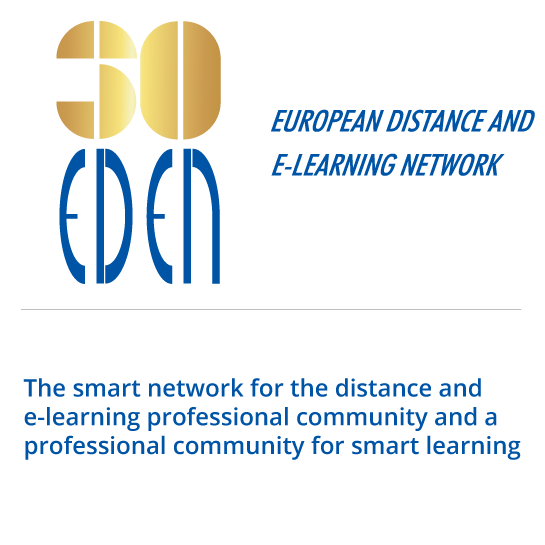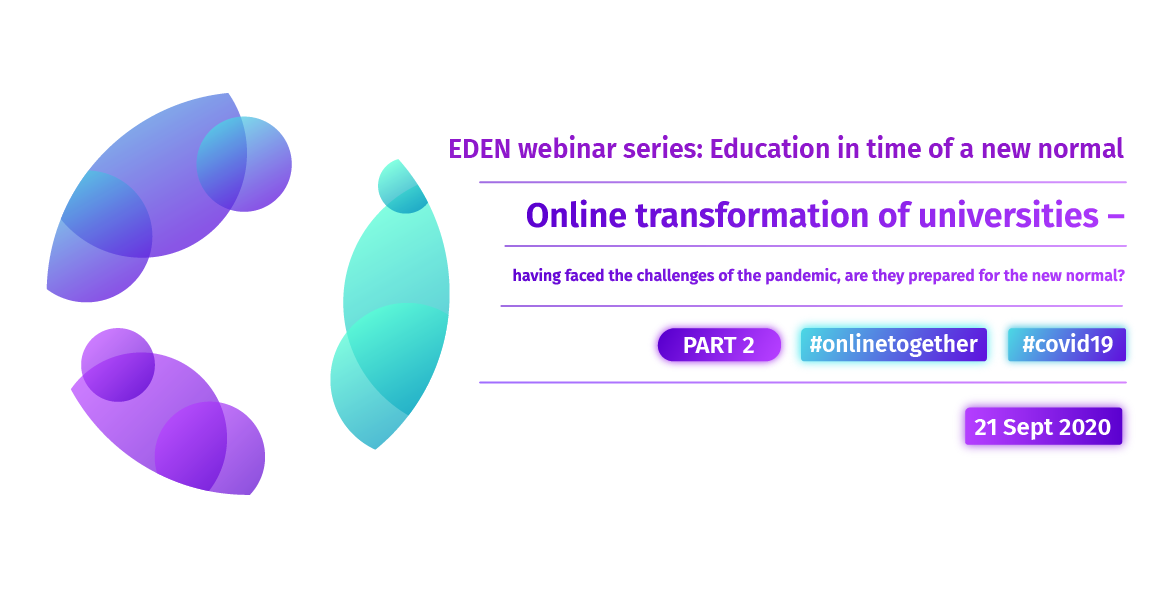Monday, 21 September 2020, 17:00 CEST
EDEN webinar
WATCH THE RECORDING VIEW THE PRESENTATIONS
Registered webinar participants will be awarded by EDEN open badges.
Description
As a result of the COVID-19 pandemic last March, universities worldwide faced the need to move all their classes to an online environment overnight, in order to ensure continuation of their teaching and learning activities. Institutions that had already ventured onto the path of online education realised this transformation much more quickly than those who were less prepared. Others made the transition more modestly, only beginning to take the first steps into online education. In a remarkable short time, courses and exams across the globe moved online, ensuring that universities did not close but rather adapted to the new situation and by doing so managed to save the remainder of the academic year.
Having overcome the initial impact of the pandemic and having moved beyond immediate crisis management, university leaders are now taking the time to reflect on the lessons learned, to set new strategies for the future, and to fully prepare their institutions for the new academic year. Although some continue to hope that students will soon return to classrooms, others see the COVID-19 crisis as a catalyst for educational organisations to implement online teaching and learning systematically and to thus offer a better quality of education in this age of the new normal. What are the key leadership decisions that organisational leaders must make in creating their vision for the future? What short-term and long-term strategies are needed? How can leadership ensure a smooth transition to the online setting and create the necessary infrastructure for training teachers, and implementing new teaching methods and redesigned curricula? How can universities manage their transition to online while improving the quality of teaching and learning? These are some of the questions we will be addressing in the first two webinars of the EDEN webinar initiative Education in time of a new normal (September 14 and 21).
Aimed at policy makers and organisational leaders and management, but also for all those working in education, these webinars will provide practical insights and tips from well-known experts, leaders, and practitioners in the field of e-learning and online learning.
Join the sessions and participate in discussions, where you will get the ideas you need to turn your vision for the future into actionable steps. Get the answers you need for smoothly leading your organisation in transforming your curriculum to online and ensuring high quality teaching and learning.
Questions that will be discussed in this webinar:
- How are academics and professional staff experiencing the rapid transfer to working from home and moving to online teaching and research?
- What groups are disadvantaged by working from home?
- How can universities reduce structural inequalities?
- Are universities more likely to transform, or mitigate in response to emergency conditions?
- Is the recent Covid19 experience enough for universities to consider real transformation?
- In order to strengthen resilience, should a university rely on a strategy of diversifying and broadening its range of courses or specializing its study program and strengthening cooperation with other universities?
- What structural, programmatic, professional and technological balance should a faculty strive for in order to be able to react successfully to changes and compensate for serious disturbances in its development?
Moderator
 Antonio Teixeira
Antonio Teixeira
Former EDEN president
Universidade Aberta, Portugal
António Teixeira is an Associate Professor of open, distance and network education at Universidade Aberta (UAb). He’s also a researcher at the University of Lisbon and collaborates with the University of Rome 3.
He was the Pro-rector for innovation in Distance Learning at Universidade Aberta (2006-09) and President of EDEN – European Distance and E-learning Network (2013-16). As a Pro-rector at UAb, António Teixeira conceived and managed the successful and speedy strategic transformation process of the university from a print-based distance learning institution to a fully online one. Throughout the years, he has integrated several boards of directors and many expert committees and task forces in higher education institutions and organizations at national and international level. He’s currently an external expert for AQU Catalunya and ACPUA quality assurance agencies in Spain and the research and innovation national agency of Uruguay (ANII) among others.
António Teixeira has participated in over thirty international research projects and authored over one hundred scientific articles and other publications. He is an EDEN Senior Fellow and a member of the Board of the Council of EDEN Fellows.
Sources:
Teixeira, A., Bates, T., & Mota, J. (2019). What future(s) for distance education universities? Towards an open network-based approach. RIED. Revista Iberoamericana de Educación a Distancia, 22 (1), pp. 107-126. doi: https://doi.org/10.5944/ried.22.1.22288
Presenters
 Mark Nichols
Mark Nichols
Executive Director at Open Polytechnic of New Zealand
Dr Mark Nichols (PFHEA) is Executive Director of Learning Design & Development with Open Polytechnic, Australasia’s largest dedicated provider of online distance education. He is a former Executive Committee member of EDEN and is currently on the ICDE EC. He hosts the podcast Leaders & Legends of Online Learning and recently published with Routledge.
Recently published book Transforming Universities with Digital Distance Education by Routledge.
 Prof. Dr.-Ing. habil. Christian-Andreas Schumann
Prof. Dr.-Ing. habil. Christian-Andreas Schumann
Faculty of Business and Economics of the University of Applied Sciences Zwickau, Germany
Prof. Dr.-Ing. habil. Christian-Andreas Schumann is Full Professor for Business Informatics at the Faculty of Business and Economics of the University of Applied Sciences Zwickau, Germany. From 2003 to 2009 Prof Schumann was Dean of the Faculty. Since 2019 he has also been the University’s Representative for International Relations.
Throughout his career Prof. Schumann was Deputy Chief Coordinator at the Chinese German University of Applied Sciences (CDHAW) / Tongji University Shanghai as well as Scientific Vice Coordinator for Business Administration and Engineering for German University Network Cooperation with Tecnológico de Monterrey. Ha cooperated with UNESCOand the Arab Academy of Sciences in Beirut as a member of the Industrial Engineering Network of the German-Jordan University (GJU). Ha was Fellow and Member of the Board of the Fellows Council of EDEN, Vice President of the Institute for Knowledge Management and Board Member of the Former German University Network for Distance Education.
Kis publication list includes more than 300 professional publications. He also managed more than 100 research projects.
Main focus: Digital Transformation, AR & VR, Applied Artificial Intelligence, Innovation Management, Knowledge and Information Management, Project Management, Interoperability and Logistics, PLM, System and process optimization in healthcare, Distance Education, e- and mobile Learning, , Educational networks.
 Prof. Allison Littlejohn
Prof. Allison Littlejohn
Director Knowledge Lab, University College London, UK
Professor Allison Littlejohn is Director of the UCL Knowledge Lab, a centre exploring the future of education with technology in the UCL institute of Education. Her research focuses on the role of professional learning in addressing global challenges, making contributions to the understanding of how people learn for work across the Energy, Finance, Health, Education and International Development sectors. Professor Littlejohn is leading a study examining the experiences of working from home for university staff and chairs a panel exploring the future of teaching with technology in the UCL Institute of Education.
Profile: https://iris.ucl.ac.uk/iris/browse/profile?upi=ALITT35
UCL Knowledge Lab: https://www.ucl.ac.uk/ioe/departments-and-centres/centres/ucl-knowledge-lab Twitter: @allisonl


